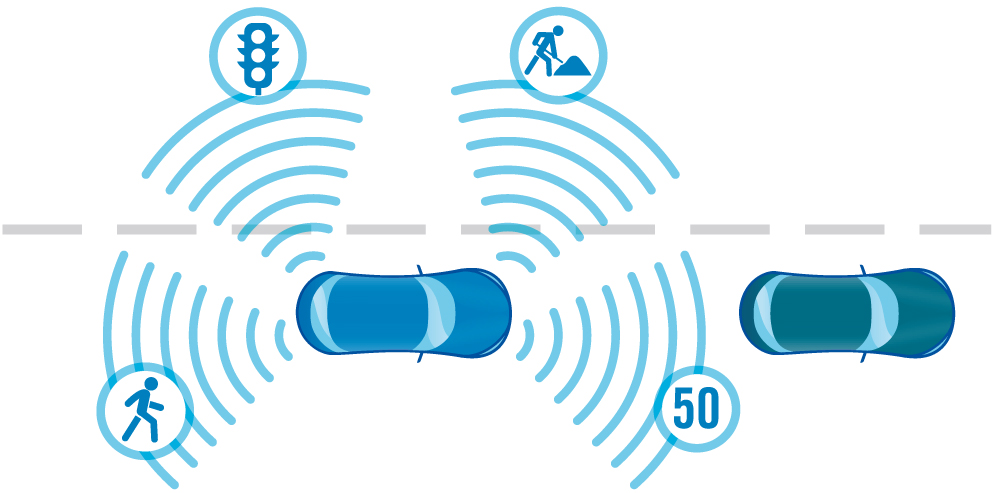Automated mobility

Automated driving will radically change mobility in the future. The integration of new technologies and communications systems opens up major potential for mobility in the 21st century, especially with regard to increasing road safety, optimising traffic efficiency, reducing energy consumption and emissions and the use and generation of potential for added value.
In the process, automated vehicles can demonstrate different degrees of automation: from the current driving assistance functions to semi-automated, highly-automated and fully automated running. This is made possible through the interaction between progressive technologies. At the same time, the driver is successively relieved by an increasing degree of automation, by being able to transfer certain driving functions to the system.
Future vehicle models will consequently move from “assisted to chauffeured driving”, whereby the autonomous (driverless) driving represents the most progressive stage of development in the automation process and should allow the targeted and independent driving of a vehicle under all conditions, without human intervention.
Future mobility systems and automated vehicles will be designed in a cooperative, networked and, subsequently, automated manner. Automated driving in particular also has the potential to reduce the number of vehicles and the use of energy in traffic. Thanks to controlled driving, a more even traffic flow can be ensured; thanks to the close link to the public transport system, a useful linking of transport processes with efficient transport systems can take place (“Sharing-Electric-Mobility-Automation"). For this to happen, the necessary legal, economic and traffic organisation framework conditions must be created.
Potential and opportunities
Through the use of automated vehicles and mobility systems, the BMK promises first and foremost:
- a significant increase in road safety,
- potential relief for the environment, as automated driving could improve the environmental impact of traffic and this could result in increased efficiency and
- Austria being reinforced as a business location, the potential for added value being exploited and in this connection, jobs being secured and further developed.
In the longer term, it will result in opportunities for future spatial and urban planning, but also the opportunity for a mobility turning point and decarbonisation, which would aim to improve the overall transport system in Austria.
BMK areas of activity
Automated driving delivers lots of potential for shaping a sustainable future for our mobility. So that the benefits of these new technologies can actually be realised, the BMK puts great emphasis on the following areas of activity:
- Allowing tests - both on public roads and in accessible test environments - and supporting the underlying technologies
- Analysing the impact of automated driving on different areas of our society, in order to draw timely conclusions and derive measures from them
Close involvement of public sector, within a framework of open dialogue between all involved
BMK measures for the introduction of automated mobility in Austria
The way to fully automated driving is not only a technological one, but also requires the regulatory framework to be adapted, in order to ensure the safe and sustainable introduction of automated vehicles.
The BMK has therefore taken the following measures to drive forward the development and introduction of automated vehicles in Austria:
- Creation of the Automated Mobility Action Package (2019-2022) (PDF, 4 MB) to ensure a sensible and efficient use of automated vehicles and mobility systems in terms of traffic as well as to strengthen Austria’s competitive position on the international stage – based on the Automated Driving Action Plan (2016-2018) (PDF, 3 MB). The BMK will support activities around automated mobility with approximately 65 million Euro in the period from 2019-2022.
- Creation of the Automated Driving Action Plan (2016-2018) (PDF, 3 MB) to establish the Austrian strategy for automated driving and the milestones.
- Establishing a national contact point for automated driving within AustriaTech, for the continuous involvement of all stakeholders involved.
- Technology support in the amount of around 20 million Euro (for the period: 2016-2018) in interacting research areas such as mobility, information and communication technologies and safety-critical research activities, as well as in the set-up and operation of test environments.
- Founding a Department for changing mobility and decarbonisation in the General Secretariat of the BMK, for the overall coordination and strategic planning of electric mobility and automated driving at the national and international level.
- Establishing an interdisciplinary Council of Experts - with comprehensive expertise in the technology, legal, ethical, spatial planning and social economy areas. This Council has an advisory function for the BMK.
- Involvement of states, towns and communities and their citizens in the common design of future activities.
- Creation of a regulatory framework, to enable the testing of specific cases of the use of automated vehicles on public roads.